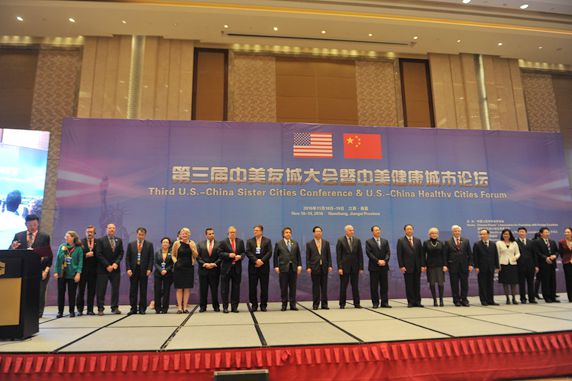
November 19, 2016
the (Nanchang Declaration for China-U.S. Healthy Cities Forum) is as follows,
On 18-19 November 2016, the Third China-U.S. Sister Cities Conference & China-U.S. Healthy Cities Forum is convened in Nanchang, Jiangxi Province, jointly hosted by the Chinese People’s Association for Friendship with Foreign Countries, National Health and Family Planning Commission of China, Jiangxi Provincial Government, U.S. Sister Cities International, and the U.S. Department of Health and Human Services. Representatives from national and local government, health officials, experts and business representatives are attending this event.
We agree that exchanges among U.S.-China sister cities act as an important bridge for enhancing friendship and cooperation at the local level, as well as a cornerstone for advancing the China-U.S. relationship. This forum is a concrete follow-up on the consensus reached by President Obama and President Xi during their meeting in September 2016, as well as the deliverables from the 8th China-U.S. Strategic and Economic Dialogue and the 7th U.S.-China Consultation on People-to-People Exchange. We believe this forum will further strengthen cooperation in the development, management, and service delivery of healthy cities, foster people-to-people exchanges, and further accelerate overall practical cooperation between the two countries.
We recognize that health is a necessary requirement in realizing the overall development of individuals, and a core impetus for social and economic sustainable development, a significant indicator of national prosperity, and a common pursuit for both of our countries’ citizens. Cities play a critical role in advancing and protecting their citizens’ health. Supporting healthy cities encourages both countries to address common problems, challenges, and opportunities related urbanization, aging, of the population, emerging non-communicable and infectious diseases, and environmental and lifestyle changes. It is also a reflection of a strong sense of responsibility, urgency, and mission in the evolution of public health practice.
The 2030 Sustainable Development Agenda adopted by United Nations in September 2015 sets important goals for global health development. In this context, we propose the following approaches to promote development of healthy cities under the 2030 Sustainable Development Agenda Framework:
1.Strive to improve health policies. Local governments may play a substantial role in adopting action plans and strategies tailored to local conditions; to address basic needs of local residents including education, housing, employment, and safety; to optimize health services; and to provide a more equitable and sustainable social security system.
2.Seek to utilize health policies and strategies to encourage the building of healthy environments, which may lead to eliminating air, water, and soil pollution; improving urban environmental sanitation; and making cities more livable and healthier built environments.
3.Effectively engage social organizations and other partners for healthy city development. This calls for active participation from communities and individuals to contribute through concrete actions on urban environmental enhancement.
4.Educate about and promote healthy lifestyles and improving the health literacy of the general public.
Participants from both countries commit to strengthen cooperation through the sister cities program including:
1.Taking into consideration the actual needs of local, advance cooperation on health, trade, education, culture, and tourism.
2.Facilitating healthy city exchanges between the two countries, organizing mutual visits and study tours among officials, experts, and scholars to exchanging views and share experiences to foster healthy city development in both countries.


